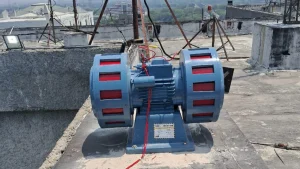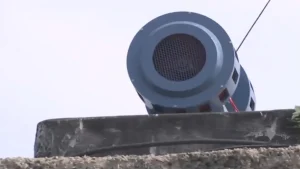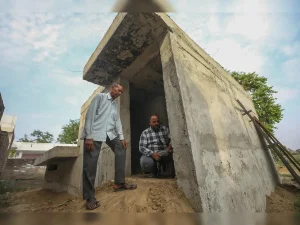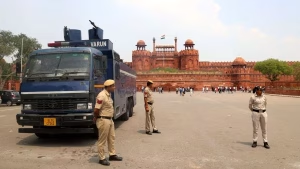New Delhi – As tensions escalate between India and Pakistan following recent drone attacks along the western border, authorities in Delhi have launched comprehensive emergency steps in Delhi amid war tensions. These measures include testing air raid sirens, identifying vulnerable areas, creating emergency shelters, and conducting public awareness campaigns to prepare citizens for potential threats.
Civil Defense Plan Activated as Part of Emergency Steps in Delhi Amid War Tensions
Officials confirmed that district magistrates across all 11 districts of the capital have been directed to invoke the Civil Defence Plan—a protocol typically reserved for war-like situations. This activation represents a significant escalation in the emergency steps in Delhi amid war tensions, as Civil Defence Volunteers have not been deployed since the 1971 war.

“Civil defence plans are invoked in war-like situations. Under this, the government issues a call to 550 Civil Defence Volunteers,” explained a senior official involved in coordinating the emergency steps in Delhi amid war tensions. “In the preparatory stage, they are trained on how to help the public, rescue and take them to a safe area.”
Also Read: Pakistan Drone Attack in Barmer: India Defends Massive Aerial Assault
Currently, fifty volunteers per district have been inducted and are undergoing daily training as part of the emergency steps in Delhi amid war tensions. These drills include testing and operating air raid sirens, providing first aid to injured civilians, and performing CPR. Officials indicated that an additional 3,000-4,000 volunteers could be mobilized if the situation deteriorates further.
Air Raid Siren Installation Central to Emergency Steps in Delhi Amid War Tensions


The installation and testing of air raid sirens constitute a critical component of the emergency steps in Delhi amid war tensions. According to Delhi PWD Minister Parvesh Sahib Singh, 40-50 air raid sirens will be installed on prominent multi-storey buildings throughout the city, each with an effective range of up to 4 kilometers.
“The Delhi government is working closely with disaster response agencies to ensure that all key and sensitive locations are covered and that public awareness protocols are effectively communicated,” Singh stated while discussing the emergency steps in Delhi amid war tensions.


In the Central district, authorities have already tested air raid sirens installed at the PWD headquarters in ITO, running trials for 15-20 minutes on Friday afternoon. Similar tests will be conducted in the New Delhi district, where sirens have been mounted on the rooftop of the NDMC Palika Kendra.
A senior official elaborated on the scope of these emergency steps in Delhi amid war tensions: “Existing sirens, which have a reach up to 3 km, have been installed. A total of 7 are installed in the New Delhi district at the Palika Bhawan, NDMC headquarters, and other strategic locations. Districts have ordered high-range sirens which will have the capacity to reach 10 km… Three in each district will cover the entire area.”
Expanding Infrastructure for Emergency Steps in Delhi Amid War Tensions
The government has announced ambitious procurement plans as part of the emergency steps in Delhi amid war tensions. Officials confirmed that the Delhi government has decided to acquire 500 sirens to be installed across the city and train 1,800 Apada Mitras (disaster management volunteers) through an agency recommended by the National Disaster Management Authority.
Meanwhile, the Southwest district has already installed both manual and electrical sirens at strategic locations including BPCL Bijwasan, Vegas Mall Dwarka, Uttam Nagar police station, Dwarka Mor Metro station, Indira Gandhi Hospital in Dwarka Sector 10, Dwarka Sector 21 Metro station, and Najafgarh SDM office as part of the emergency steps in Delhi amid war tensions.
In total, authorities are procuring 27 new high-powered air raid sirens to complement existing infrastructure. These coordinated efforts reflect the comprehensive nature of the emergency steps in Delhi amid war tensions, which aim to create multiple layers of public warning systems.
Emergency Shelter Preparation Central to Emergency Steps in Delhi Amid War Tensions


District magistrates have been instructed to prepare detailed inventories of facilities that could serve as emergency shelters during a crisis. This aspect of the emergency steps in Delhi amid war tensions includes identifying schools, community halls, and basements that could accommodate displaced or threatened civilians.
The Emergency Operations Centre (EOC) and district-level control rooms have been directed to maintain 24/7 operations as part of the emergency steps in Delhi amid war tensions. “The EOCs have been directed to ensure that updated contact lists, communication equipment, and coordination protocols are in place for inter-agency response and activation of warning sirens, emergency support functions, and establish hotlines with other agencies including local military authorities on priority,” officials stated.
Public Awareness Campaigns Complement Emergency Steps in Delhi Amid War Tensions
Recent mock drills have formed an integral part of the emergency steps in Delhi amid war tensions, focusing on public education about appropriate responses during emergencies. These drills have trained citizens on protocols to follow when sirens sound, including shelter-in-place procedures and evacuation routes.
“Coordinated rehearsals of activation of sirens and blackout drills will be carried out to improve the overall protective posture of the community with due focus on schools, RWAs, panchayats, market associations, etc, through a focused campaign,” explained a senior official involved in implementing the emergency steps in Delhi amid war tensions.
Security Enhanced Across Capital as Part of Emergency Steps in Delhi Amid War Tensions
Security has been significantly strengthened across major monuments and historical places in Delhi. Police have increased vigilance in high-footfall areas, including markets, railway stations, malls, parks, and Metro stations as part of the emergency steps in Delhi amid war tensions.

Officials emphasized that security coverage in vulnerable, high-risk, and densely populated areas is crucial to the success of the emergency steps in Delhi amid war tensions. These security measures are being coordinated with the broader disaster management framework to ensure a cohesive response capability.
Continuous Monitoring Central to Emergency Steps in Delhi Amid War Tensions
“All districts have been directed to prepare detailed plans as per these points and directions, whichever applies to their district, and share these with the divisional commissioner and Delhi government,” said a senior official describing the coordination mechanisms established as part of the emergency steps in Delhi amid war tensions.
The implementation of emergency steps in Delhi amid war tensions represents the government’s commitment to civilian protection during the current period of heightened regional instability. While officials emphasize that these measures are precautionary, they underscore the seriousness with which authorities are approaching the current security situation.
As the situation continues to evolve, Delhi’s comprehensive emergency steps in Delhi amid war tensions demonstrate the capital’s determination to protect its citizens while maintaining essential services and public order during this challenging period.

